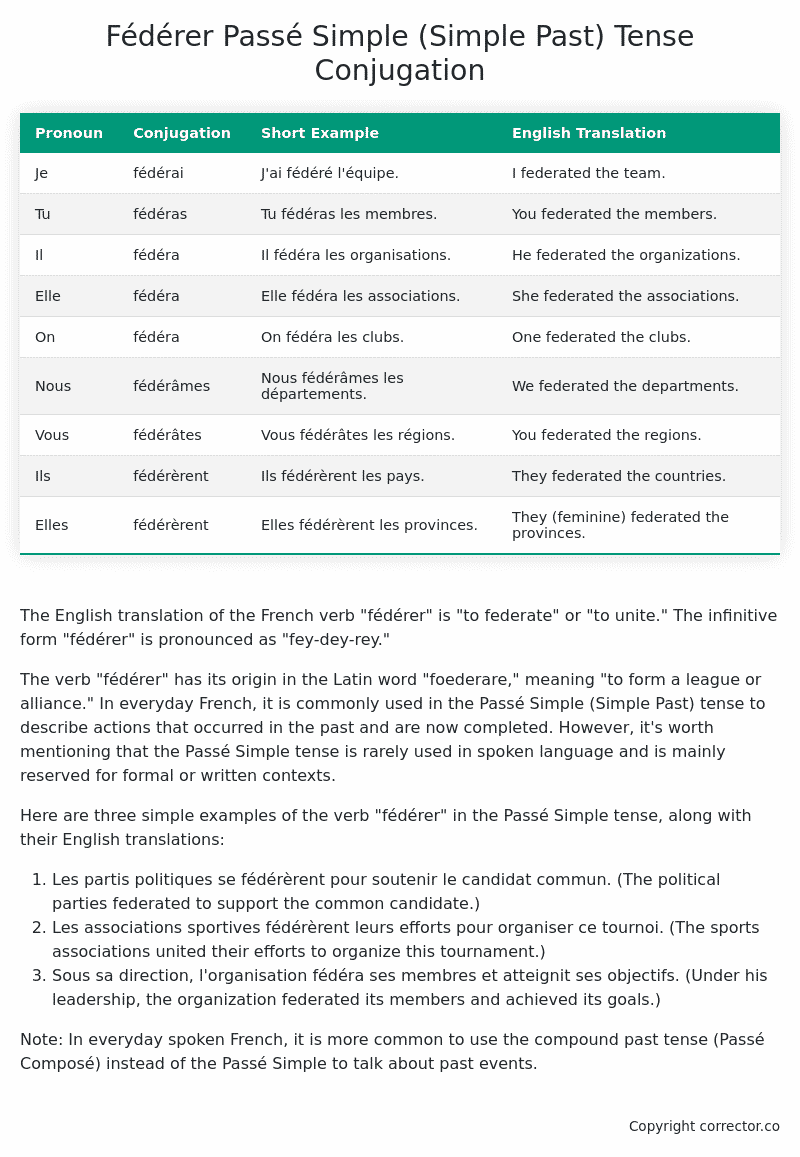Passé Simple (Simple Past) Tense Conjugation of the French Verb fédérer
Introduction to the verb fédérer
The English translation of the French verb “fédérer” is “to federate” or “to unite.” The infinitive form “fédérer” is pronounced as “fey-dey-rey.”
The verb “fédérer” has its origin in the Latin word “foederare,” meaning “to form a league or alliance.” In everyday French, it is commonly used in the Passé Simple (Simple Past) tense to describe actions that occurred in the past and are now completed. However, it’s worth mentioning that the Passé Simple tense is rarely used in spoken language and is mainly reserved for formal or written contexts.
Here are three simple examples of the verb “fédérer” in the Passé Simple tense, along with their English translations:
- Les partis politiques se fédérèrent pour soutenir le candidat commun. (The political parties federated to support the common candidate.)
- Les associations sportives fédérèrent leurs efforts pour organiser ce tournoi. (The sports associations united their efforts to organize this tournament.)
- Sous sa direction, l’organisation fédéra ses membres et atteignit ses objectifs. (Under his leadership, the organization federated its members and achieved its goals.)
Note: In everyday spoken French, it is more common to use the compound past tense (Passé Composé) instead of the Passé Simple to talk about past events.
Table of the Passé Simple (Simple Past) Tense Conjugation of fédérer
| Pronoun | Conjugation | Short Example | English Translation |
|---|---|---|---|
| Je | fédérai | J’ai fédéré l’équipe. | I federated the team. |
| Tu | fédéras | Tu fédéras les membres. | You federated the members. |
| Il | fédéra | Il fédéra les organisations. | He federated the organizations. |
| Elle | fédéra | Elle fédéra les associations. | She federated the associations. |
| On | fédéra | On fédéra les clubs. | One federated the clubs. |
| Nous | fédérâmes | Nous fédérâmes les départements. | We federated the departments. |
| Vous | fédérâtes | Vous fédérâtes les régions. | You federated the regions. |
| Ils | fédérèrent | Ils fédérèrent les pays. | They federated the countries. |
| Elles | fédérèrent | Elles fédérèrent les provinces. | They (feminine) federated the provinces. |
Other Conjugations for Fédérer.
Le Present (Present Tense) Conjugation of the French Verb fédérer
Imparfait (Imperfect) Tense Conjugation of the French Verb fédérer
Passé Simple (Simple Past) Tense Conjugation of the French Verb fédérer (You’re reading it right now!)
Passé Composé (Present Perfect) Tense Conjugation of the French Verb fédérer
Futur Simple (Simple Future) Tense Conjugation of the French Verb fédérer
Futur Proche (Near Future) Tense Conjugation of the French Verb fédérer
Plus-que-parfait (Pluperfect) Tense Conjugation of the French Verb fédérer
Passé Antérieur (Past Anterior) Tense Conjugation of the French Verb fédérer
Futur Antérieur (Future Anterior) Tense Conjugation of the French Verb fédérer
Subjonctif Présent (Subjunctive Present) Tense Conjugation of the French Verb fédérer
Subjonctif Passé (Subjunctive Past) Tense Conjugation of the French Verb fédérer
Subjonctif Imparfait (Subjunctive Imperfect) Tense Conjugation of the French Verb fédérer
Subjonctif Plus-que-parfait (Subjunctive Pluperfect) Tense Conjugation of the French Verb fédérer
Conditionnel Présent (Conditional Present) Tense Conjugation of the French Verb fédérer
Conditionnel Passé (Conditional Past) Tense Conjugation of the French Verb fédérer
Conditionnel Passé II (Conditional Past II) Tense Conjugation of the French Verb fédérer
L’impératif Présent (Imperative Present) Tense Conjugation of the French Verb fédérer
L’impératif Passé (Imperative Past) Tense Conjugation of the French Verb fédérer
L’infinitif Présent (Infinitive Present) Tense Conjugation of the French Verb fédérer
L’infinitif Passé (Infinitive Past) Tense Conjugation of the French Verb fédérer
Le Participe Présent (Present Participle) Tense Conjugation of the French Verb fédérer
Le Participe Passé (Past Participle) Tense Conjugation of the French Verb fédérer
Struggling with French verbs or the language in general? Why not use our free French Grammar Checker – no registration required!
Get a FREE Download Study Sheet of this Conjugation 🔥
Simply right click the image below, click “save image” and get your free reference for the fédérer Passé Simple tense conjugation!

Fédérer – About the French Passé Simple (Simple Past) Tense
Formation
Usage
Narration
Historical Context
Interactions with other tenses
Passé Composé
Imparfait
Conditional and Subjunctive
Summary
I hope you enjoyed this article on the verb fédérer. Still in a learning mood? Check out another TOTALLY random French verb conjugation!


